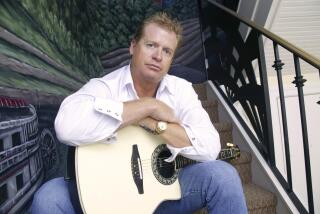Tries to Dispel Image as Televangelist : Robertson Seeks to Broaden His Appeal
- Share via
VIRGINIA BEACH, Va. — “I am not running for chief pastor, I am running for President,” Pat Robertson says, over and over.
For Robertson, overcoming the perception that he is first and foremost a televangelist has become one of the biggest challenges of his Republican presidential campaign as he seeks to broaden his appeal to secular voters.
He has challenged voters to see him not as an evangelist but as a man of varied accomplishments who parlayed a Yale law degree, political savvy inherited from a father in the U.S. Senate and his own determination and business acumen into a $184 million-a-year television, educational and charitable complex. He also asks that he be judged not on his views of the Bible, but on his pronouncements about world and domestic affairs.
Increasingly, both critics and neutral observers have begun to take up Robertson’s challenge and examine his so-called secular record for additional clues to his character and outlook. Those who admire Robertson praise him as a decisive, brilliant leader who can justifiably take credit for building the most innovative and economically sound of all the broadcast ministries. Detractors, on the other hand, call him capricious.
Rags-to-Riches Story
There is no disputing Robertson’s rags-to-riches success story. He was a struggling evangelical minister when he began the Christian Broadcasting Network in 1960 by buying a Portsmouth, Va., UHF television station that was deeply in debt. Robertson got it for nothing down, and went to work for donations to keep it going. In 1963 he hit upon the idea of asking for $10 a month from at least 700 viewers to meet the network’s $7,000-a-month operating costs, the basis of the “700 Club” show. By 1965 Robertson’s telethons had put his fledgling network on a firm financial basis, and he began to expand the facilities and affiliate system that would form the basis of the modern CBN.
He was a pioneer in the use of satellite transmissions to cable television systems, thereby forming a “fourth network” of family and religious programming. Advertisers began to line up to sponsor the shows. In its most recently completed fiscal year, CBN reported revenue of $184.6 million, $135.5 million of that in contributions and $38.2 million from sales of commercial time.
Satellite Technology
David Edwin Harrell Jr., a historian at the University of Alabama who recently published a study of Robertson, saw the CBN success story as a combination of shrewd decision making and fortuitous timing. “You can’t look at it and just pooh-pooh the whole thing,” Harrell said. “Within that whole world of religious evangelism he clearly brought better business expertise and better business judgment than most of them. But there is no question that he also got very lucky. He caught satellite technology and cable television technology at the right time.”
And despite Robertson’s call for the public to divorce the businessman from the televangelist when evaluating his presidential credentials, those who have worked closely with Robertson or studied him acknowledge that his business success was made possible in part by the fact that his religious mission inspires almost limitless loyalty from employees.
“Pat’s instincts work because he does inspire tremendous amounts of loyalty for the people who work for him,” said Roy Carlisle, a former Harper & Row editor who worked with Harrell on the book. “It is that unique blend of charisma that creates a lot of loyalty. But that’s not a typical business way of doing things. That’s a religious way of doing things.”
‘Scrambling After Visions’
It was a loyalty that was tested on numerous occasions. For example, Robertson is renowned at CBN for making sudden decisions: to build a university, to start a news division, to market a Bible for the masses. Those decisions startled the very CBN staffers who had to turn around and implement them.
“People got used to scrambling after Pat’s visions,” said Denuda Soderman, Robertson’s one-time “700 Club” co-anchor.
But Jerry Straub, a former CBN producer who has written a book critical of Robertson, remembers being stunned when Robertson, with no prior warning, went on the air one day in 1979 and declared his intention to create the CBN news division. “He just announced it,” Straub said. “That was it. It was left to the rest of us to figure out how to do it. . . . Does this sound like a businessman?”
Robertson’s temper is well known to close friends and associates. In the studio, Soderman said, it was well-controlled: “He’s the only man I know who can shout in a whisper.”
Ben Kinchlow, Robertson’s other co-host, is quoted in Harrell’s book as saying: “Sloppiness or slothfulness would send him on a tear.”
S. Tucker Yates Jr., a close friend of Robertson and a member of CBN’s board of directors, acknowledged that Robertson can be “headstrong” and “difficult to work for” and tends to bridle when challenged.
Robertson’s Perfectionism
“That’s something he has to work with,” Yates said. “But I guess when you’re a smart man who’s usually right, you have a tendency to be that way.”
Harrell said Robertson’s perfectionism and the personal focus of his operation was well suited for CBN, though the biographer acknowledged that such traits in a leader might hamstring a more traditional business enterprise.
“I would say that his weakness as a business person might be that the organization is very tightly strung and very highly centered around his personality,” Harrell said. “But I’m not sure that you can build a religious network without that--the personality and the charisma of the founder are very important.”
That same personality and charisma is the hallmark of Robertson’s oratory, which has lately touched off a series of flaps. In recent days Robertson has claimed that Cuba housed Soviet nuclear missiles and that associates of Vice President George Bush were somehow involved in disclosing the Jimmy Swaggart sex scandal. A claim that he once knew the location of American hostages in Lebanon brought a public rebuke from President Reagan.
Acumen at Conceptualizing
Details and follow-through are not Robertson strengths. Few doubt his acumen at conceptualizing, but his involvement in ministry projects often wanes once they get off the drawing board. Operation Blessing, a multimillion-dollar charity arm, is a case in point. CBN funds and assistance are funneled to the needy through local churches, in the process cutting red tape and bureaucratic costs that would mount if CBN tried to oversee distribution itself.
In campaign leaflets, Robertson brags that Operation Blessing has given him “more firsthand experience with inner-city welfare than any presidential candidate of either party.” But CBN officials acknowledge that Robertson has little active involvement in the program since he launched it in 1978.
“He was one of the ones who thought the idea up and made it happen,” said CBN spokesman Joseph Gray. “But he hasn’t been active in the internal operation of it.”
Harrell, the biographer, contends that, beyond charity, a principal goal of Operation Blessing was to bridge the amorphous gap between CBN headquarters and churches across the country. It is a link, Harrell suggests, “that has probably served him well politically.”
Role as School’s Founder
Another CBN division, its 10-year-old graduate university, also figures prominently in Robertson’s campaign drive. He cites his role as the school’s founder to validate credentials as an experienced educator and frequently quotes studies by university faculty to back up theories on education reform and a wide variety of other subjects.
But just as it is with Operation Blessing, Robertson’s role at the university has been more inspirational than practical. “When he calls himself an educator I laugh,” said one obviously embittered former professor. “I don’t know that he ever went into the classroom.”
Robertson served as university president for the first few years of its existence, but eventually relinquished the title. Robertson now serves as the university’s chancellor, a role that board member Tucker Yates acknowledged is “just a title so that he will be connected with it.”
Even university officials admit the institution has been less than a resounding success. The goal was to permeate secular society with dedicated Christians trained, in line with biblical precepts, for leadership roles in the media, education and politics. The university’s formal statement of mission declares that graduates “will prepare the United States and other nations for the coming of Jesus Christ and the establishment of his kingdom on Earth.”
But perusal of the university’s list of alumni suggests that at least 65% have not entered secular professions and have remained in the ministry in one way or another. Many have stayed on at CBN, and others have gone to work for Robertson’s presidential campaign.
CBN Operations Attacked
Some CBN operations have come under attack from outside critics as fronts to further Robertson’s political aims.
For example, besides charitable works in this country, the tax-exempt Operation Blessing has also been used to funnel humanitarian aid to anti-communist forces in Central America as well as prop up financially strapped farmers in Iowa, the site of the first major electoral test of the campaign season.
Meanwhile, the Internal Revenue Service is looking into millions of dollars of CBN contributions used to bankroll the tax-exempt Freedom Council, a Christian voter education project spearheaded by Robertson associates. The group was disbanded in 1986 amid charges that it was a thinly veiled attempt to promote his presidential drive.
There are indications, although circumstantial, that Robertson’s presidential ambitions have proved a drain on CBN’s fiscal health. The network and its collateral agencies have fallen on what employees repeatedly refer to as “tough times” in the last two years. While millions of dollars poured into Robertson coffers, contributions to his ministry--its principal revenue source--began to flag as he skipped more and more “700 Club” shows to launch an exploratory campaign drive. Last year, he quit the show altogether.
Contributions Dip Sharply
Another sharp dip in contributions hit CBN, as well as other broadcast ministries, in the wake of the sex scandal that rocked Jim Bakker’s PTL Club last spring. Widespread layoffs have reduced CBN’s payroll to 1,478 full-time workers--substantially lower than the 4,000 figure it was citing just over two years ago, though ministry officials now concede the higher figure had been inflated by counting part-time workers and volunteers.
Even though money woes have lost CBN the position as the Virginia Beach area’s largest employer, business and community leaders still hold a generally positive impression of Robertson’s business accomplishments.
“I have really long admired Pat Robertson for his business skill and acumen, frankly, differently from Pat Robertson as a TV evangelist or as a minister,” said Vincent J. Mastracco Jr., a Norfolk attorney who has worked alongside Robertson on the board of a local bank and consulted for him on projects for CBN.
“On a number of occasions he would talk with me about ways of financing projects that were frankly as creative as anything those of us who did it for a living could come up with. . . . He would talk about interest rates and charges and costs, sales and lease-back, syndication--not necessarily second nature to the kind of a person whose primary duty is that of being a minister.”
Staff writer Lee May also contributed to this story.
More to Read
Sign up for Essential California
The most important California stories and recommendations in your inbox every morning.
You may occasionally receive promotional content from the Los Angeles Times.










